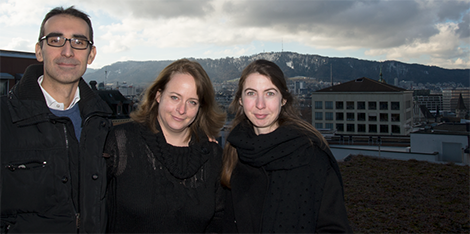
The World Economic Forum’s (WEF) annual meeting brings together global leaders from governments, companies, science and international organizations as well as societal actors. Three members of the CSS attended this year’s WEF in Davos. While Myriam Dunn Cavelty and Matteo Bonfanti joined discussions on different aspects of cybersecurity, Sophie Fischer presented on the role of Artificial Intelligence (AI) in international politics.
Cybersecurity and AI again figured prominently in this year’s program at the WEF. It is thus no surprise that Myriam Dunn Cavelty and Matteo Bonfanti, two of several cyber experts at the CSS, as well as Sophie Fischer who is in the process of writing her doctoral thesis on national and international security implications of emerging dual-use technologies, attended this year’s conference.
For the CSS, the WEF kicked off on Wednesday, 23 January, when Dr. Myriam Dunn Cavelty joined a high-ranking panel on the “Future Frontiers of Cybersecurity”. According to the WEF, global expenditure on cybersecurity already exceeded $90 billion in 2018 and the risk of cyber-attacks is expected to increase further due to ever more connected devices and users. This raises the question of how public and private sector actors can prepare for emerging cybercrime threats and vulnerabilities. With Dr. Dunn Cavelty on the panel to address this pertinent question were Troels Oerting Jorgensen, Head of the Centre for Cybersecurity at the WEF, Nikesh Arora, CEO and Chairman of the Palo Alto Networks, Oliver Bäte CEO of Allianz and Jürgen Stock Secretary-General of Interpol.
Dr. Dunn Cavelty also presented at a panel on “Ensuring Privacy and Protection in Cyberspace” co-organized by ETH Zurich and the Swiss National Science Foundation (SNF). She was joined by Srdjan Capkun, Director of the Zurich Information Security and Privacy Center at ETH Zurich, EPFL’s Carmela Troncoso, Pranjal Sharma, Contributing Editor at Businessworld, and Angelika Kalt, Director Swiss National Science Foundation.

Later the same day, CSS’ Sophie Fischer took part in a panel on AI organized by ETH Zurich. Together with Eric Horvitz and Marc Pollefeys from Microsoft as well as André Loesekrug-Pietri from the Joint European Disruptive Initiative, Ms Fischer discussed the global political implications of Artificial Intelligence (AI).
On Thursday, 24 January, CSS’ Dr. Matteo Bonfanti attended a panel on “Artificial Intelligence, Big Data & Cyber Security” organized by Caspian Week. His presentation addressed the so-called cybercrime-terror “nexus”, i.e. the existing or potential interplay between criminal and terrorist activities in or through cyberspace. Joining the discussion with Dr. Bonfanti were Paolo Lezzi, Executive Vice President of the European Center for Advanced Cyber Security, Pascal Buchner, Chief Information Officer, International Air Transport Association (IATA), Alessandro Trivilini, Head Digital Forensics Lab, University of Applied Sciences of Southern Switzerland (SUPSI) and Marco Passalia, Secretary General of the Lugano Commodity Trading Association and member of the Ticino Parliament.
On Friday, 25 January, the last day of this year’s WEF, Dr. Dunn Cavelty joined a discussion on “The Next Frontiers. How Will Europe Lead in Tech” with André Loesekrug-Pietri from the Joint European Disruptive Initiative and Jürgen Schmidhuber from IDSIA. The discussion revolved around the question of whether and how democracies can use disruptive technologies as a force for good.
Further Information
About the Attendees
Dr. Myriam Dunn Cavelty is a senior lecturer for security studies and deputy for research and teaching at the Center for Security Studies (CSS). @CyberMyri
Sophie-Charlotte Fischer is a PhD candidate at the Center for Security Studies (CSS). @SophieCFischer
Dr. Matteo E. Bonfanti is Senior Researcher at the Center for Security Studies. @Teobonf05
For more information on issues and events that shape our world, please visit the CSS website.

